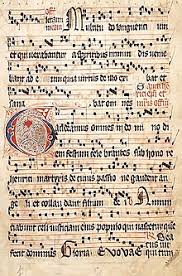The Divine Office is the prayer book of priests. It consists of psalms, hymns and prayers that are said through the day. Some lay people use a shorter version of it, at morning and evening I mention it because the infancy Gospel of Luke contains the words of the old man, Simeon, who greeted the Christ child in the temple:
Lord, now lettest thou thy servant depart in peace, according to thy word;
for mine eyes have seen thy salvation
which thou hast prepared in the presence of all peoples,
a light for revelation to the Gentiles,
and for glory to thy people Israel.[1]
Every night, before going to bed, the priest recites these words as a preparation for sleep. It is known as the Canticle of Simeon, and it is not unlike two others that are found in chapter two of Saint Luke’s Gospel: the Canticle that Zechariah, the father of John the Baptist, proclaimed at the birth of his son, and the Magnificat, the Canticle Mary sang when she responded to the greeting of Elizabeth. Zechariah’s hymn is recited every morning in the Office and the Magnificat every evening.
All three have something in common: they look to the future. Consider Simeon’s, for instance. Jesus is described as “a light for revelation to the Gentiles and for glory to they people Israel.” Simeon, like Zechariah and the Blessed Virgin, was looking ahead to the saving work of Jesus. And today? We look back to what Christ accomplished in the past. But Simeon reminds us to look forward too, for the redemption won by Jesus has to be incorporated into our lives. You see, then, that there is a future element in the new life made available to us in baptism. In one sense everything has been accomplished by the death and resurrection of Jesus. But in another way, it has to be realized, i.e., made real in the lives each of us leads in the power that come to us through the sacraments.
Saint Luke calls our attention to another person who met Jesus when he was presented in the temple: the prophetess Anna who “did not depart from the temple, worshiping with fasting and prayer night and day.”[2] We know that every event, every person recorded in Scripture is also a prophecy, pointing, in the Old Testament, to the coming of Christ and, in the New, to the Christian era. Anna, therefore, tells us something about the Church. Are there women who devote themselves to prayer and fasting, night and day? In other words, are there women who have dedicated themselves to God in a total, uncompromising manner? Of course there are—or were—many of them, prominent everywhere in Church life. I’m thinking of the nuns who ran schools, orphanages, hospitals, such as the Sisters of Saint Joseph. Other, such as the Carmelites or Poor Clares, are purely contemplative with, like Anna, an apostolate of prayer. Their numbers are much reduced nowadays, for a variety of reasons, but the example of Anna still bears fruit in the Church There are women living in the world, with jobs and an independent way of life, who dedicate themselves to God, like Anna, in prayer and service. In Canada we have, for instance, the Company of Saint Ursula and the Contemplative Women of Saint Anne, composed of just such women.
And they all, past or present, remind us that every Christian is called upon to commit himself to the Lord by prayer and self-abnegation in order that God may be praised by our lives and our neighbours aided by our prayers and example.
[1] Lk 2.29-32.
[2] Lk 2.37.


